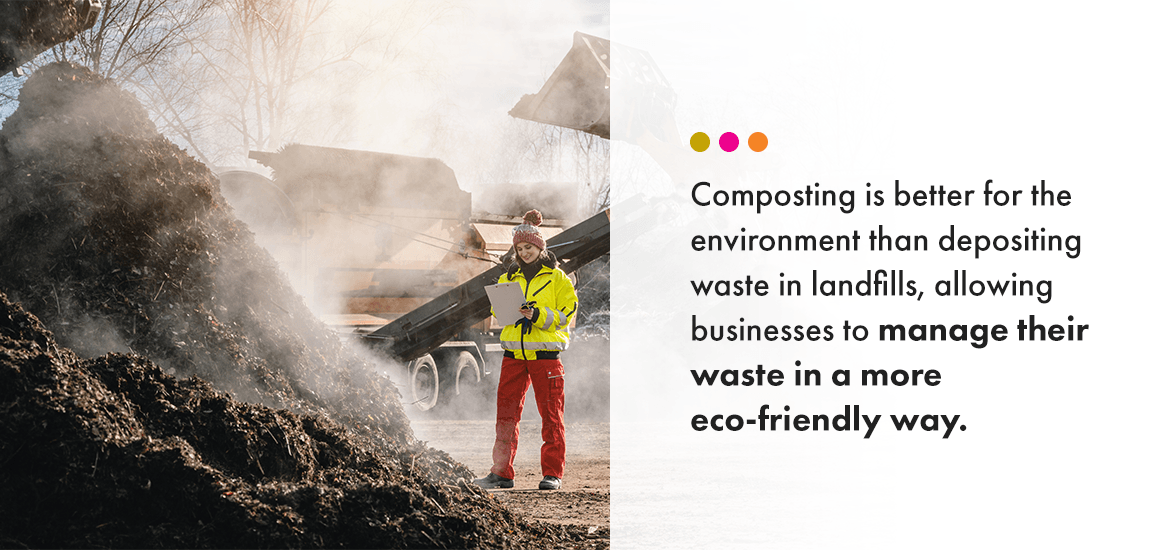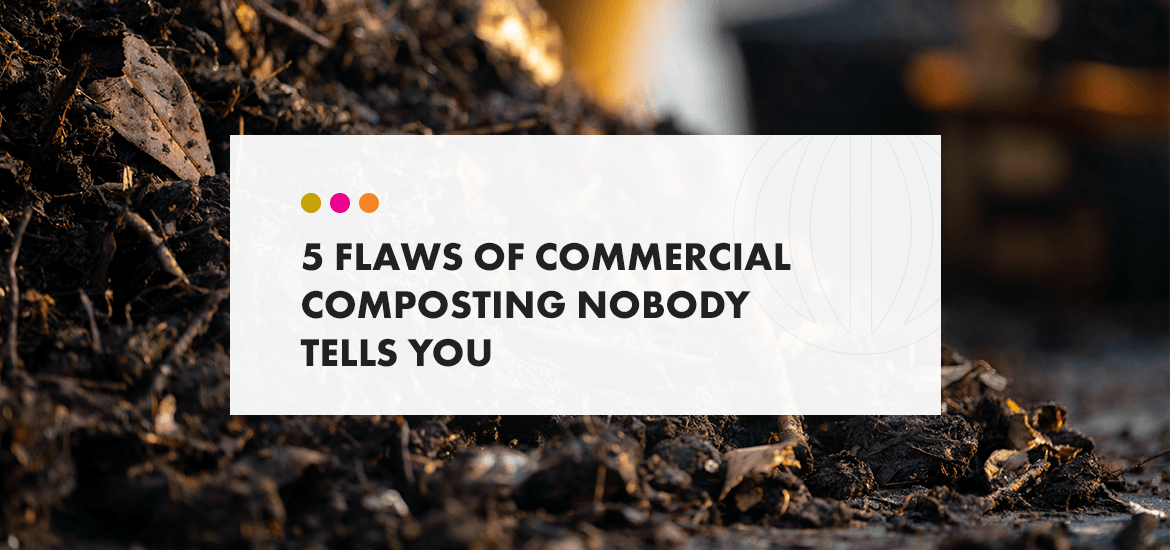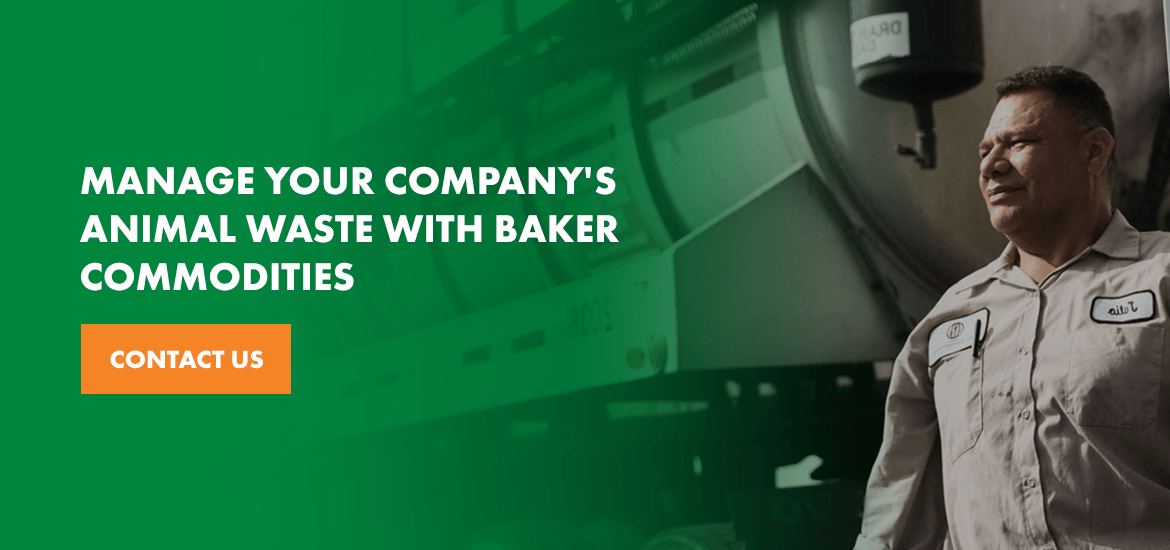5 Flaws of Commercial Composting Nobody Tells You
Table of Contents:
Understanding how waste management processes help or hinder the environment is crucial to human health and natural resources, and composting is one method businesses may want to reconsider.
While commercial composting is a popular waste management method, it is not always the most environmentally friendly. Composting reuses food waste to fertilize soil and help plants grow, but it releases harmful greenhouse gases into the environment when it decomposes, similar to how organic waste decomposes in landfills.
Before choosing a waste management method, it’s important to understand some composting disadvantages and learn about safer alternatives.
What Are the Pros and Cons of Composting?
Composting is a natural waste management method that transforms organic waste into fertilizer. This process creates nutrient-rich compost by combining water, garden scraps and food waste. While it may be healthier for the environment than depositing waste in a landfill, composting has the following pros and cons:
Pros of Composting
Composting is better for the environment than depositing waste in landfills, allowing businesses to manage their waste in a more eco-friendly way. Composting can also help businesses reduce their chemical fertilizer use by using natural compost fertilizer. Some businesses reduce their garbage pickups by composting organic materials and decreasing the amount of waste they dispose of in the trash.

Cons of Composting
While it may seem like a great solution, there are some drawbacks to composting. Composting requires a precise balance of materials, moisture content, particle size, oxygen flow and temperature to be effective, which complicates the process and leaves significant room for potential errors. It also introduces organic materials to the Earth’s soil, which affects the atmosphere as materials decompose.
The following composting disadvantages make this waste management method less eco-friendly than other alternatives:
1. Compost Quality Depends on Its Ingredients
The effectiveness of compost is based on what you put in it. Therefore, low-quality food waste can result in poor compost that fails to fulfill its purpose. Some compost may require additional fertilizer to yield results, which adds yet another step to the process.
2. Composting Is a Slow Process
Organic materials can take a month or up to a year to completely decompose. As a result, organic materials reside in the soil for an extended time and release greenhouse gases as they decompose, similar to how materials break down in a landfill. Depending on the materials used in composting, the compost may have to sit for a significant period of time before it becomes useful.
3. Composting Can Spread Diseases
Bacteria aids the composting process by decomposing organic waste. This bacteria can facilitate the spread of diseases, posing a threat to human and animal health. Compost materials also attract pests to business sites, which can further increase the risk of disease.
4. Not All Organic Material Is Suitable for Composting
Some organic materials are not suitable for composting. Meat is not always the best ingredient for composting, which reduces some of the food waste businesses can compost. Alternative eco-friendly waste management methods can repurpose animal by-products, so companies can maximize their sustainability efforts.
5. Compost Can Contain Damaging Components
Compost can also contain components that are hazardous to the environment. Random materials such as leaves from the road, animal feces, asbestos and petroleum can end up in batches of compost, introducing toxins to the environment. For example, motor oil can contaminate leaves and the compost they mix with.
Why Composting Is Bad
Many people believe composting is the best alternative to landfills, but it is quite similar to landfills, and it can harm the environment. The composting process is almost the same as sending waste to the landfill because it leaves organic materials to decompose, which releases greenhouse gases into the environment.
Composting Alternatives
Sustainable waste management options such as animal rendering and grease and cooking oil collection are much safer than composting for the environment. These composting alternatives use animal by-products to make important products, including animal feed, personal care materials, lubricants and clean-burning biofuel. Rather than compost your organic waste, consider the following options:
Rendering
According to the North American Renderers Association, approximately 50% of animal parts are inedible, and people typically assume they are unusable. Therefore, about 50% of animal parts end up in landfills. Rendering takes these animal by-products and turns them into commodities such as animal feed, fertilizer, fuel and personal care products.
Rendering reduces animal waste in landfills and minimizes companies’ carbon footprints. This process also reduces greenhouse gas emissions because it uses animal waste to make useful products rather than returning it to the environment to release gases.
Baker Commodities uses a modern fleet of trucks to collect animal by-products from businesses and transport them to rendering facilities. Our rendering facilities are eco-friendly and work efficiently to process and recycle animal waste daily. Our rendering process recycles unused animal materials into useful products to lessen waste and help companies decrease their carbon footprints.
Grease and Cooking Oil Collection
Another composting alternative is grease and cooking oil collection. Grease and cooking oil can become ingredients in products such as animal feed, lubricants and clean-burning biofuel. Baker Commodities collects grease and cooking oil to reclaim and renew it before returning it to the marketplace.
Manage Your Company’s Animal Waste With Baker Commodities
How businesses manage their waste has a significant impact on the environment. While composting may seem like a beneficial waste management solution on the surface, you can access better alternatives. Composting contributes harmful greenhouse gases to the atmosphere, which is just as damaging as allowing waste to decompose in landfills.
Trust Baker Commodities with your animal waste to make the most of your unused animal by-products. Baker Commodities collects and safely transports animal by-product materials such as bones, grease and fat to rendering facilities that are carbon negative.
Our eco-friendly, carbon negative rendering facilities operate efficiently to process and recycle animal waste materials daily. Contact Baker Commodities to learn more about how our services can help your company implement a more environmentally friendly waste management strategy.




